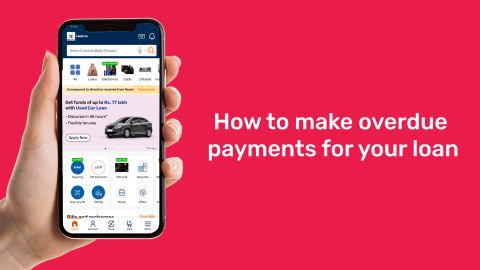3 min
27-September-2024
Part payment charges refer to the fees imposed by financial institutions when borrowers make payments exceeding the scheduled EMI but less than the total loan amount. This practice, also known as partial prepayment, helps reduce the outstanding loan principal, leading to lower interest payments and shorter loan tenures. However, financial institutions, such as Bajaj Finance, may impose charges to offset potential loss of interest.
Understanding these charges is essential for borrowers considering part payments as part of their repayment strategy. Bajaj Finance’s part payment charges, for instance, can vary based on factors like the type of loan, the amount prepaid, and the remaining loan tenure. By knowing the terms and conditions associated with part payment charges, borrowers can make informed decisions about how to manage their loans, save on interest, and avoid unnecessary fees. Let's dive deeper into how Bajaj Finance structures these charges and ways to make part payments efficiently.
For personal loans, Bajaj Finance typically allows part payments only after a specific number of EMIs have been paid, usually a minimum of six months. The charges generally range from 2-4% of the prepaid amount, depending on the loan agreement. In the case of home loans or larger secured loans, part payments may have more flexible terms, but still, a fee is likely to apply.
It's essential for borrowers to review their loan agreement and consult with Bajaj Finance to understand the applicable part payment charges. By being aware of these fees, borrowers can plan their repayments strategically, potentially saving money while avoiding unexpected costs.
How Bajaj Finance calculates part payment fees?
Next, consider planning your part payments in line with Bajaj Finance’s terms. For example, if the maximum limit for part payment is 25% of the outstanding amount, try to stay within this limit to avoid additional charges. Also, reviewing the loan type is crucial, as some secured loans may have more lenient part payment conditions, reducing the associated fees.
Timing your part payments correctly, preferably when your financial condition allows lump-sum payments, can help you reduce overall interest without incurring high fees. It’s also a good idea to discuss with Bajaj Finance beforehand, as some special schemes or offers may waive part payment charges. By staying informed and strategic, borrowers can make part payments without unnecessary extra costs.
Understanding these charges is essential for borrowers considering part payments as part of their repayment strategy. Bajaj Finance’s part payment charges, for instance, can vary based on factors like the type of loan, the amount prepaid, and the remaining loan tenure. By knowing the terms and conditions associated with part payment charges, borrowers can make informed decisions about how to manage their loans, save on interest, and avoid unnecessary fees. Let's dive deeper into how Bajaj Finance structures these charges and ways to make part payments efficiently.
Understanding Bajaj Finance part payment charges
Bajaj Finance imposes part payment charges when borrowers decide to repay a portion of their loan ahead of schedule. This fee compensates the lender for potential interest loss due to early repayment. Part payment charges vary based on several factors, including the type of loan, the percentage of the loan prepaid, and the loan tenure.For personal loans, Bajaj Finance typically allows part payments only after a specific number of EMIs have been paid, usually a minimum of six months. The charges generally range from 2-4% of the prepaid amount, depending on the loan agreement. In the case of home loans or larger secured loans, part payments may have more flexible terms, but still, a fee is likely to apply.
It's essential for borrowers to review their loan agreement and consult with Bajaj Finance to understand the applicable part payment charges. By being aware of these fees, borrowers can plan their repayments strategically, potentially saving money while avoiding unexpected costs.
How Bajaj Finance calculates part payment fees?
- Percentage of prepaid amount: Bajaj Finance usually calculates part payment charges as a percentage of the prepaid amount. For instance, if the charge is 2% and you make a part payment of ₹1,00,000, the fee would be ₹2,000.
- Type of loan: The type of loan significantly affects part payment charges. Personal loans may incur higher fees than secured loans like home loans, where part payments are often more flexible.
- Loan tenure: The remaining loan tenure is another factor. Loans with longer remaining tenures may attract higher part payment charges, as the lender stands to lose more interest.
- Minimum EMIs paid: Bajaj Finance may require a borrower to have paid a specific number of EMIs, typically six or more, before making any part payments. Failing to meet this requirement may result in the inability to make a part payment, or additional charges may apply.
- Maximum part payment limit: Bajaj Finance also sets a maximum limit on how much can be prepaid at once, typically up to 25% of the outstanding loan amount. Going over this limit may trigger additional fees or restrictions.
Making part payments without extra costs
To avoid or minimise part payment charges with Bajaj Finance, borrowers should consider a few strategies. First, it's essential to make part payments only after a minimum number of EMIs have been cleared, typically six. Making a prepayment too early can trigger additional fees. Always check the loan agreement for this condition.Next, consider planning your part payments in line with Bajaj Finance’s terms. For example, if the maximum limit for part payment is 25% of the outstanding amount, try to stay within this limit to avoid additional charges. Also, reviewing the loan type is crucial, as some secured loans may have more lenient part payment conditions, reducing the associated fees.
Timing your part payments correctly, preferably when your financial condition allows lump-sum payments, can help you reduce overall interest without incurring high fees. It’s also a good idea to discuss with Bajaj Finance beforehand, as some special schemes or offers may waive part payment charges. By staying informed and strategic, borrowers can make part payments without unnecessary extra costs.
Benefits of early part payments
- Reduced interest payments: Making early part payments decreases the principal amount, leading to lower overall interest costs over the loan tenure.
- Shortened loan tenure: By reducing the principal, borrowers can pay off their loans faster, freeing them from debt sooner.
- Improved credit score: Timely repayments and lower outstanding balances can positively impact your credit score.
- Flexibility in EMIs: Early part payments can allow for flexibility in future EMIs, potentially reducing the monthly burden.
- Avoidance of EMI bounce charges: Keeping your loan manageable helps prevent issues like EMI bounce charges.
- Access to the customer portal: Easily track your loan status and payments through the customer portal.




